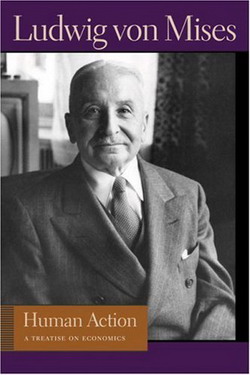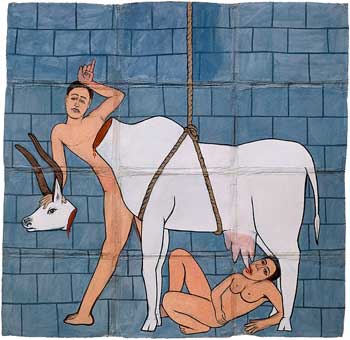 Economics deals with society’s fundamental problems; it concerns everyone and belongs to all. It is the main and proper study of every citizen (Ludwig von Mises, Human Action).
Economics deals with society’s fundamental problems; it concerns everyone and belongs to all. It is the main and proper study of every citizen (Ludwig von Mises, Human Action).
The following address was delivered before the University Club of New York, April 18, 1950, by Doctor Ludwig von Mises:
How Middle-of-the-Road Policy Leads to Socialism
The fundamental dogma of all brands of socialism and communism is that the market economy or capitalism is a system that hurts the vital interests of the immense majority of people for the sole benefit of a small minority of rugged individualists. It condemns the masses to progressing impoverishment. It brings about misery, slavery, oppression, degradation and exploitation of the working men, while it enriches a class of idle and useless parasites.
This doctrine was not the work of Karl Marx. It had been developed long before Marx entered the scene. Its most successful propagators were not the Marxian authors, but such men as Carlyle and Ruskin, the British Fabians, the German professors and the American Institutionalists. And it is a very significant fact that the correctness of this dogma was contested only by a few economists who were very soon silenced and barred from access to the universities, the press, the leadership of political parties and, first of all, public office. Public opinion by and large accepted the condemnation of capitalism without any reservation.
1. Socialism
But, of course, the practical political conclusions which people drew from this dogma were not uniform. One group declared that there is but one way to wipe out these evils, namely to abolish capitalism entirely. They advocate the substitution of public control of the means of production for private control. They aim at the establishment of what is called socialism, communism, planning, or state capitalism. All these terms signify the same thing. No longer should the consumers, by their buying and abstention from buying, determine what should be produced, in what quantity and of what quality. Henceforth a central authority alone should direct all production activities.
2. Interventionism, Allegedly a Middle-of-the-Road Policy
A second group seems to be less radical. They reject socialism no less than capitalism. They recommend a third system, which, as they say, is as far from capitalism as it is from socialism, which as a third system of society’s economic organization, stands midway between the two other systems, and while retaining the advantages of both, avoids the disadvantages inherent in each. This third system is known as the system of interventionism. In the terminology of American politics it is often referred to as the middle-of-the-road policy. What makes this third system popular with many people is the particular way they choose to look upon the problems involved. As they see it, two classes, the capitalists and entrepreneurs on the one hand and the wage earners on the other hand, are arguing about the distribution of the yield of capital and entrepreneurial activities. Both parties are claiming the whole cake for themselves. Now, suggest these mediators, let us make peace by splitting the disputed value equally between the two classes. The State as an impartial arbiter should interfere, and should curb the greed of the capitalists and assign a part of the profits to the working classes. Thus it will be possible to dethrone the moloch capitalism without enthroning the moloch of totalitarian socialism.
Yet this mode of judging the issue is entirely fallacious. The antagonism between capitalism and socialism is not a dispute about the distribution of booty. It is a controversy about which two schemes for society’s economic organization, capitalism or socialism, is conducive to the better attainment of those ends which all people consider as the ultimate aim of activities commonly called economic, viz., the best possible supply of useful commodities and services. Capitalism wants to attain these ends by private enterprise and initiative, subject to the supremacy of the public’s buying and abstention from buying on the market. The socialists want to substitute the unique plan of a central authority for the plans of the various individuals. They want to put in place of what Marx called the “anarchy of production” the exclusive monopoly of the government. The antagonism does not refer to the mode of distributing a fixed amount of amenities. It refers to the mode of producing all those goods which people want to enjoy.
The conflict of the two principles is irreconcilable and does not allow for any compromise. Control is indivisible. Either the consumers’ demand as manifested on the market decides for what purposes and how the factors of production should be employed, or the government takes care of these matters. There is nothing that could mitigate the opposition between these two contradictory principles. They preclude each other. Interventionism is not a golden mean between capitalism and socialism. It is the design of a third system of society’s economic organization and must be appreciated as such.
3. How Interventionism Works
It is not the task of today’s discussion to raise any questions about the merits either of capitalism or of socialism. I am dealing today with interventionism alone. And I do not intend to enter into an arbitrary evaluation of interventionism from any preconceived point of view. My only concern is to show how interventionism works and whether or not it can be considered as a pattern of a permanent system for society’s economic organization.
The interventionists emphasize that they plan to retain private ownership of the means of production, entrepreneurship and market exchange. But, they go on to say, it is peremptory to prevent these capitalist institutions from spreading havoc and unfairly exploiting the majority of people. It is the duty of government to restrain, by orders and prohibitions, the greed of the propertied classes lest their acquisitiveness harm the poorer classes. Unhampered or laissez-faire capitalism is an evil. But in order to eliminate its evils, there is no need to abolish capitalism entirely. It is possible to improve the capitalist system by government interference with the actions of the capitalists and entrepreneurs. Such government regulation and regimentation of business is the only method to keep off totalitarian socialism and to salvage those features of capitalism which are worth preserving.
On the ground of this philosophy, the interventionists advocate a galaxy of various measures. Let us pick out one of them, the very popular scheme of price control.
4. How Price Control Leads to Socialism
The government believes that the price of a definite commodity, e.g., milk, is too high. It wants to make it possible for the poor to give their children more milk. Thus it resorts to a price ceiling and fixes the price of milk at a lower rate than that prevailing on the free market. The result is that the marginal producers of milk, those producing at the highest cost, now incur losses. As no individual farmer or businessman can go on producing at a loss, these marginal producers stop producing and selling milk on the market. They will use their cows and their skill for other more profitable purposes. They will, for example, produce butter, cheese or meat. There will be less milk available for the consumers, not more.
This, or course, is contrary to the intentions of the government. It wanted to make it easier for some people to buy more milk. But, as an outcome of its interference, the supply available drops. The measure proves abortive from the very point of view of the government and the groups it was eager to favor. It brings about a state of affairs, which again, from the point of view of the government, is even less desirable than the previous state of affairs which it was designed to improve.
Now, the government is faced with an alternative. It can abrogate its decree and refrain from any further endeavors to control the price of milk. But if it insists upon its intention to
keep the price of milk below the rate the unhampered market would have determined and wants nonetheless to avoid a drop in the supply of milk, it must try to eliminate the causes
that render the marginal producers’ business unremunerative.
It must add to the first decree concerning only the price of milk a second decree fixing the prices of the factors of production necessary for the production of milk at such a low rate that the marginal producers of milk will no longer suffer losses and will therefore abstain from restricting output. But then the same story repeats itself on a remoter plane. The
supply of the factors of production required for the production of milk drops, and again the government is back where it started. If it does not want to admit defeat and to abstain from any meddling with prices, it must push further and fix the prices of those factors of production which are needed for the production of the factors necessary for the production of milk. Thus the government is forced to go further and further, fixing step by step the prices of all consumers’ goods and of all factors of production, both human, i.e., labor, and material, and to order every entrepreneur and every worker to continue work at these
prices and wages.
No branch of industry can be omitted from this all-round fixing of prices and wages and from this obligation to produce those quantities which the government wants to see produced. If some branches were to be left free out of regard for the fact that they produce only goods qualified as non-vital or even as luxuries, capital and labor would tend to flow into them and the result would be a drop in the supply of those goods, the prices of which government has fixed precisely because it considers them as indispensable for the satisfaction of the needs of the masses. But when this state of all-round control of business is attained, there can no longer be any question of a market economy. No longer do the citizens by their buying and abstention from buying determine what should be produced and how.
The power to decide these matters has devolved upon the government. This is no longer capitalism; it is all-round planning by the government, it is socialism.


